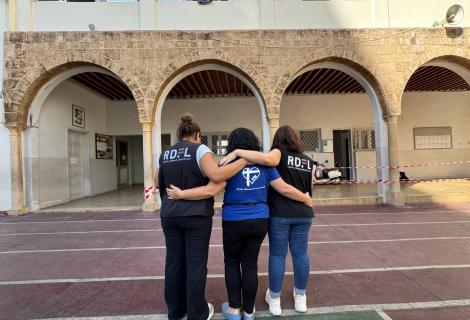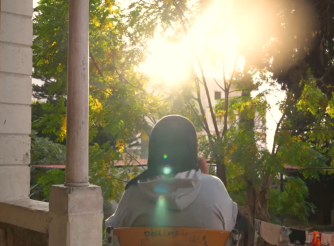Women’s basic needs are being neglected during conflict

A note to the reader: This article was written before the Lebanon conditional ceasefire, but details of ActionAid’s support remain relevant as the situation continues to evolve.
“Imagine having to manage your period with no period products, toilet paper, or soap, and no chance of being able to wash yourself. On the one hand, it’s yet another example of women finding ways to cope in unimaginable conditions. On the other, it’s a reminder that conflict strips women of everything – even their dignity.”
– Sabine Abiaad, ActionAid’s Regional Campaigns Coordinator based in Beirut.
In times of conflict, beyond the immediate losses of food, clean drinking water and safe living conditions, dignity is often one of the first things to be taken away – and no one feels this loss more acutely than women and girls.
For women displaced by the violence of Israeli attacks in Lebanon, the lack of access to sanitary products serves as a stark reminder of how women's basic needs are too often overlooked or treated as a luxury. For many of them, this situation is all too reminiscent of their experiences of the past during the Israeli war on Lebanon. In any conflict, women’s basic needs are never a high priority.
At ActionAid Arab Region (AAAR), we believe that it is not enough to simply respond to the immediate survival needs of women and girls in conflict – we must also prioritise keeping their dignity intact.
Hundreds of thousands of people have been displaced by the Israeli war on Lebanon – more than half of them women and girls – either seeking refuge in shelters or living in unfinished buildings, tents, parks or on the streets. Beyond the scarcity of food, water, shelter and physical safety, the conflict has brought additional hardships for women, forcing them to resort to what can only be described as desperate measures: with little access to pads, toilets and clean water, women and girls are struggling to manage their periods. In some cases, they have resorted to tying black bags around their waists as a makeshift solution, according to the Lebanese Women Democratic Gathering (RDFL).
“The conditions [in the shelters] are very hard and inhumane,” says Roula Zeaiter, Program Manager at RDFL. “People have been given mattresses and blankets, but there are basic needs left unnoticed, particularly women’s needs. Women on their period are wrapping black bags around their waist.”

This already dire situation is made even worse by rising costs. In the Bekaa region, where RDFL is supporting displaced women, the price of sanitary pads has skyrocketed as market sellers hike prices in response to the crisis. For families already stretched thin by years of economic hardship, basic period products have tragically become a luxury they can no longer afford.
Adding to these difficulties, many schools where people are sheltering do not have designated shower areas, leaving women with no way to bathe, further jeopardising their health and well-being. As Roula Zeaiter points out, “Even in the best scenarios, the ratio is one shower for every 100 people, making it really difficult to maintain personal cleanliness, especially for women during their periods.”
AAAR and our partners are working to provide women and girls in shelters with hygiene kits that include period products and toiletries. But these supplies are limited, and as the attacks continue, the number of displaced people continues to grow. As Sabine Abiaad shares, “The chaos of the past few weeks has sent shock and panic throughout Lebanon. Many women and girls have been forced to seek safety in overcrowded shelters, where the conditions make it almost impossible for them to manage their periods in a safe, hygienic way that preserves their dignity.”
While we at AAAR call on all parties to the conflict to ensure the protection of civilians, in line with international humanitarian law, and to cease hostilities immediately, we also want to stress that women’s needs cannot be overlooked in humanitarian responses. AAAR and its partners are doing all we can to meet these needs – but more must be done. Governments and humanitarian actors must ensure that women’s dignity and safety are integral to all humanitarian responses because no one should have to worry about the added burden of managing such a basic need while navigating the chaos of conflict.


